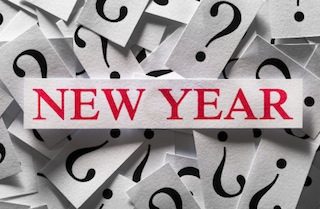11 Questions to Ask Yourself at the Start of a New Year
 Yesterday, we shared our new year visions with each other, and we took a look at some of the resources you have at your disposal here at Mark’s Daily Apple and PrimalBlueprint.com. Today, I’d like to help you further explore your goals and motivations, and assist you in establishing a concrete plan of attack for 2014. One of the best ways I’ve found to do this is in my own life is to ask myself tough questions about my successes and failures, and to be brutally honest with my replies. In this article, I’ll suggest you do the same.
Yesterday, we shared our new year visions with each other, and we took a look at some of the resources you have at your disposal here at Mark’s Daily Apple and PrimalBlueprint.com. Today, I’d like to help you further explore your goals and motivations, and assist you in establishing a concrete plan of attack for 2014. One of the best ways I’ve found to do this is in my own life is to ask myself tough questions about my successes and failures, and to be brutally honest with my replies. In this article, I’ll suggest you do the same.
Now, this exercise must be done with some dedicated effort. A passing read through the questions while nodding only to forget about them in twenty minutes won’t get the job done. Discuss them with a friend, spouse, or loved one to make them real. Write them down on a piece of paper, or type your answers out. However you pay special attention to this exercise, give careful, thoughtful answers. This is about resolutions, but even more than that, this is about dialogue. Open, honest dialogue between your multiple selves, between the person that should be doing this or would rather be accomplishing that, and the person who does neither but desperately wants to. The resolutions will come, but expect it to take a little work. Let’s get to it…
1. What were your biggest failings or mistakes this past year – healthwise – that were preventable or avoidable?
As you do what we all do and revisit the ups and downs of 2013, focus on the downs that you could have prevented, the downs that you brought about by your actions (or inactions), because that’s where the meatiest, most relevant resolutions lie. That’s where you’ll discover what you don’t want to happen in the new year, and what you can do differently to ensure a positive outcome. Some of your mistakes were technically preventable but totally unforeseeable, and by identifying and reflecting on them you can see the warning signs next time.
2. What were your biggest health problems that were not preventable or avoidable – and how did you respond?
We learn amazing things about ourselves and our capacities when faced with unavoidable hardships that must be endured. A freak slip on ice that leads to a torn ligament and weeks of forced sedentism. The emergence of a health condition determined by genetics and chance. These reveal weak points, and strong points. They reveal room for improvement and areas where we deserve congratulation.
3. Which food consistently has the worst effect on you? How does it make you feel (or look, or perform)?
Food is a powerful determinant of our health, perhaps the most powerful. Avoiding food that makes you feel awful, then, is one of the most basic, fundamental resolutions a person interested in self improvement can make. You don’t want to resolve to stop eating food that hypothetically is bad for you, though. That can be a part of your resolution, but it’s not the focus point. Avoiding food that has already been shown to have negative effects on you? Now that’s a resolution that will definitely make a difference. By listing, in lurid, excruciating detail, the effect this food or foods have on you, the resolution will fall into place on its own because “how can you possibly ignore it?”
4. What concrete step or steps will you take to fulfill a more abstract resolution?
“Eat healthier” is a worthy goal. “Improve my fitness” is great. “Get outside more” is an admirable goal, but how do you actually do it? What does it mean? How are you going to accomplish those things? Those are abstract resolutions, the kind we all make, because they’re simple and easy to come up with. Everyone wants to “be a better person.” But it’s ultimately meaningless unless direct actionable steps are taken that get you closer to its realization.
5. Why are you where you are?
It’s a very fundamental question that works on several levels. What lifestyle choices led up to your current standing? Make any dietary changes? Exercise more, exercise less, exercise differently? How was the sleep, stress, sex? If “where you are” is a bad place, understanding how you got there will show you what to avoid in the future. If you’re in a good place, understanding how you got there will help you maintain the upward trajectory. You can’t establish causation or isolate all variables, but this isn’t peer review. This is about making some good, effective resolutions.
6. How will you hold yourself accountable?
Many, maybe most, New Year’s resolutions go unresolved because they exist only in the ether. No one but the person making them knows of their existence, and even that person usually avoids taking any real steps to make sure he’s sticking to the plan – if there’s a plan at all. So ask yourself how you’re going to avoid that common pitfall. Maybe you tell a friend. Maybe you track your progress in a Primal journal.
7. What kind of criticism have you received lately?
While we all need to look inward, self-reflections are often (or maybe always) biased. We see what we want to see, even when we’re trying to do some serious soul-searching. To bypass that potential problem, take a moment to think back on any criticism you’ve received from other people, even off the cuff stuff. What might have seemed like a malicious, undeserved attack at the time – “You’re so selfish!” – could actually be a legitimate fault that you should probably try to correct, or at least confront. Answers lie outside of us, too. How you appear to others might be an indication of how you actually are. Even it’s not an accurate portrayal and they’ve got you all wrong, you should figure out why you come across that way.
8. What are you willing to do to change?
We make a lot of resolutions that sound awesome, giving little thought to the fact that many changes are hard. They require work, and sacrifice, and, well, change – which is hard in and of itself. You’ve got a few vague ideas about changes you’d like to make, or maybe even some definite ones. Lay out all the things that might go into your resolution, and be a little pessimistic. Make it sound worse than it (probably) will be, because things rarely go smoothly. Do you still want to make that change?
9. What are you physically unable to do (comfortably) that you’d like to be able to do (comfortably)?
Just as the most effective type of exercise is the kind that you actually enjoy and are willing to do consistently, the most effective kind of fitness resolution aims to solve a problem that you actually have. Think about the physical acts you’d like to be able to perform but currently cannot, like comfortably sit in a squat for ten minutes, play full-court pickup basketball on the “good court,” hike the local mountain without feeling like you’re dying, do a pullup, or deadlift twice your bodyweight. It could be anything, really, as long as it’s something you actively want to do. To arrive at a fitness resolution that will serve a needed deficit in your life, identify the deficits.
10. What, or who, stands in your way?
Know your enemies. Size up your opponents. Take stock of what you’re up against, even (or especially) if its your own procrastination. That way, you’re not blindsided when stuff doesn’t fall into place immediately. And hey, you might even make mini-resolutions to deal with these opponents (you might have to, in fact). Let’s hope you don’t have an actual human arch-nemesis who’s trying to thwart your every move and sporting an evil-looking pencil thin mustache (although on second thought, that could be an incredible motivator) and you’re only talking in the abstract here.
11. If you could do anything with your life, and money were no object, what would you do?
It’s a common question, for good reason: it gets to the heart of what makes you tick. Knowing what you want out of life – in a big picture kind of way – will help you formulate effective resolutions that will actually get you closer to that goal. The funny thing about this one is that having excellent health usually figures prominently in the answer.
Spend some quality time going over these questions, either with yourself or with someone else. Talk them out. Write your answers down. Then, see how you feel about your New Year’s resolutions. See if you want to make any new ones or modify the ones you already have.
I hope these questions aid you in the eternal quest for New Year’s resolutions that actually happen! Thanks for reading!
Order The Primal Blueprint Starter Kit and Take Control of Your Health Today!

Mark Sisson's Blog
- Mark Sisson's profile
- 199 followers



